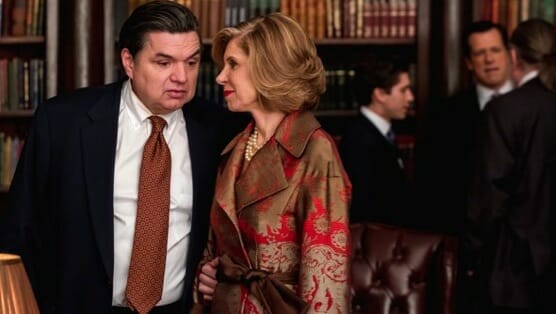The Good Wife: “Loser Edit”
(Episode 6.18)

On last night’s The Good Wife we learned that religion is a helluva drug.
But before we get to that, I need to shout out my new favorite character on the show, Awesome Working Investigator Dad, AKA Mr. Riley. First of all, he shows up in offices with his two kids on a leash. We’ve all seen this parent at the airport, or on the street and we have judged them. At least, many of us did before we had kids, at which point we finally understood—even if we didn’t fully embrace and employ—the kid on a leash thing. But as an editor and writer who does 90% of her work in a house of babies, I so enjoyed watching this frazzled, sleep-deprived guy with pockets full o’ cheerios, working his ass off, with babies in tow. And the character, despite looking somewhat crazed and ridiculous, kicks ass at his job. He’s this great reminder of how we often underestimate people with children—and this investigator was not one to be underestimated.
“Loser Edit” opens with “Saint Alicia” doing a puff piece with kindly, lovely journalist, Petra Morris. We see Petra in the editing room crafting a story around Alicia. Every shot, every music choice shows us the good wife, and good mother-turned good lawyer and good State’s Attorney. But Petra gets an e-mail ridiculously (and yet appropriately) titled “Dirt on your gal Alicia!” and the narrative and editing process changes. In the infamous scandal shot of Alicia standing by Peter, she shifts from being the only person in color, to turning black-and-white, as the dark shadow of her naughty e-mails is cast upon her. At least, that’s the message that will be conveyed.
With these smart editing scenes, and Diane’s storyline at the Plenary Institute with Reese (based on the discrimination cases against Jack Phillips’ Masterpiece Cakeshop, and wedding planner Susan Latimer), this Good Wife episode seems to suggest that most people are sheep. We learned this watching Alicia run for SA—so much of politics is about giving people something to believe in, and someone to follow. In the mock trial Diane’s line of questioning with the plaintiff was really fascinating. The Bible says a lot of things about a lot of people, but Diane specifically uses Jesus as the jumping off point—nowhere in the Bible does he speak against homosexuals, but there are four instances where he speaks against divorce. It’s no surprise that the plaintiff admits to servicing couples who had been previously married, and it’s an excellent example of just one form of hypocrisy that seems almost impossible to evade in organized religion. Again, it’s like the game of politics, where some of the “rules” seem totally arbitrary and made up—but it’s how the system works. Alicia can confess to flirting, but not a physical affair. A man can have a scandal, but he must publicly apologize, with his wife standing by his side. For what? Because, thems the rules [that somebody, likely, completely made up].
Perhaps even more complicated than all this is the concept of personal morality and beliefs, which we see explored in a few ways. There’s the case with the wedding planner, but we also see Diane and Reese face off. Diane feels used when she realizes she was a guinea pig for his case, and Reese is visibly wounded when she brings in his gay nephew (going for the jugular, as he told her to) for the mock trial. They each have their own definition of “going too far,” and sort of cast moral judgement upon each other. And then there’s Alicia, who does not want to lie about her relationship with Will, despite the huge negative impact it would have. It feels wrong to deny him, especially because he’s no longer here. And it takes a real, live, adult conversation with Peter to persuade her to make the right choice for her career. In the end, it may not have made the difference, because Petra found a new, far more damaging angle—election fraud.
“Loser Edit” is another strong episode, but the conclusion tells me that it was also a well-crafted set-up for next week’s installment. Alicia has another battle to fight on the SA front, and now that Kalinda has been caught, it looks like we can expect a major rippling effect. In addition to these great storylines, I have to add that—once again—the format of the episode was equally compelling. The focus on Petra’s editing and those images of the different scenarios Diane and Reese’s team were throwing around at the top of the episode were reminders that The Good Wife team is always looking for new and interesting ways to tell these stories. With such wonderful characters and plots, they could get away with being a lot lazier; it’s one of the best show on TV (and my personal favorite) because settling for a “good enough” Good Wife, is not something we’ve had to do this season.
Stray Observations:
-

-

-

-

-

-

-

-

-

-

-

-

-

-

-

-

-

-

-

-

-

-

-

-

-

-

-

-

-

-

-

-

-

-

-

-

-

-

-

-








































